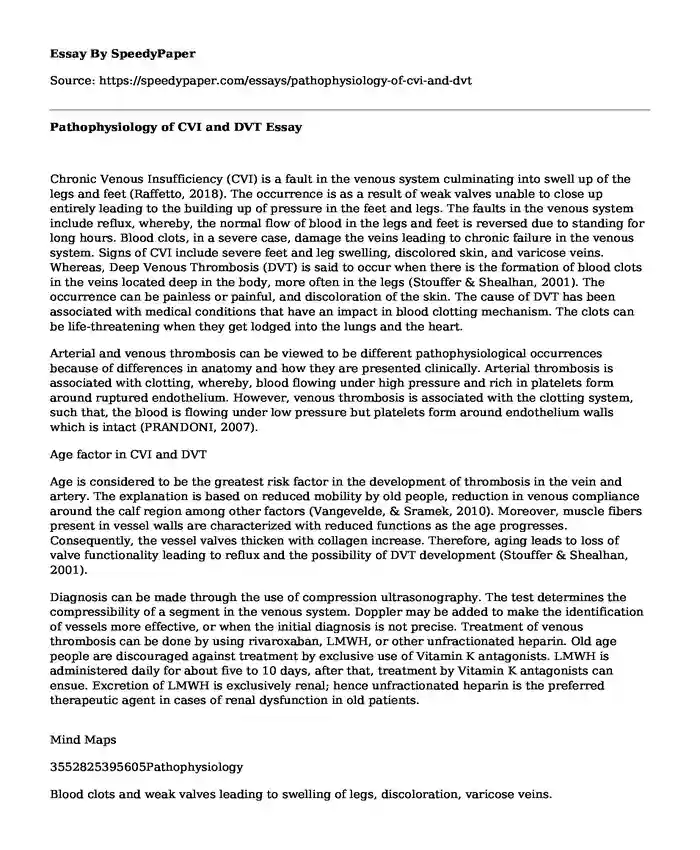
| Type of paper: | Critical thinking |
| Categories: | Management Law Medicine |
| Pages: | 3 |
| Wordcount: | 688 words |
Chronic Venous Insufficiency (CVI) is a fault in the venous system culminating into swell up of the legs and feet (Raffetto, 2018). The occurrence is as a result of weak valves unable to close up entirely leading to the building up of pressure in the feet and legs. The faults in the venous system include reflux, whereby, the normal flow of blood in the legs and feet is reversed due to standing for long hours. Blood clots, in a severe case, damage the veins leading to chronic failure in the venous system. Signs of CVI include severe feet and leg swelling, discolored skin, and varicose veins. Whereas, Deep Venous Thrombosis (DVT) is said to occur when there is the formation of blood clots in the veins located deep in the body, more often in the legs (Stouffer & Shealhan, 2001). The occurrence can be painless or painful, and discoloration of the skin. The cause of DVT has been associated with medical conditions that have an impact in blood clotting mechanism. The clots can be life-threatening when they get lodged into the lungs and the heart.
Arterial and venous thrombosis can be viewed to be different pathophysiological occurrences because of differences in anatomy and how they are presented clinically. Arterial thrombosis is associated with clotting, whereby, blood flowing under high pressure and rich in platelets form around ruptured endothelium. However, venous thrombosis is associated with the clotting system, such that, the blood is flowing under low pressure but platelets form around endothelium walls which is intact (PRANDONI, 2007).
Age factor in CVI and DVT
Age is considered to be the greatest risk factor in the development of thrombosis in the vein and artery. The explanation is based on reduced mobility by old people, reduction in venous compliance around the calf region among other factors (Vangevelde, & Sramek, 2010). Moreover, muscle fibers present in vessel walls are characterized with reduced functions as the age progresses. Consequently, the vessel valves thicken with collagen increase. Therefore, aging leads to loss of valve functionality leading to reflux and the possibility of DVT development (Stouffer & Shealhan, 2001).
Diagnosis can be made through the use of compression ultrasonography. The test determines the compressibility of a segment in the venous system. Doppler may be added to make the identification of vessels more effective, or when the initial diagnosis is not precise. Treatment of venous thrombosis can be done by using rivaroxaban, LMWH, or other unfractionated heparin. Old age people are discouraged against treatment by exclusive use of Vitamin K antagonists. LMWH is administered daily for about five to 10 days, after that, treatment by Vitamin K antagonists can ensue. Excretion of LMWH is exclusively renal; hence unfractionated heparin is the preferred therapeutic agent in cases of renal dysfunction in old patients.
Mind Maps
3552825395605Pathophysiology
Blood clots and weak valves leading to swelling of legs, discoloration, varicose veins.
00Pathophysiology
Blood clots and weak valves leading to swelling of legs, discoloration, varicose veins.
104775394970Epidemiology
17% in males, 40% in females.
Popular in Western countries.
00Epidemiology
17% in males, 40% in females.
Popular in Western countries.
Chronic Venous Insufficiency
36861752476501790700247650
4133850247650Diagnosis
Compression Ultrasonography
00Diagnosis
Compression Ultrasonography
1971675200025Chronic Venous Insufficiency
In
00Chronic Venous Insufficiency
In
3686175109220
1447800660402781300660400151765Clinical Presentation
Numerous clotting
00Clinical Presentation
Numerous clotting
197167593980Treatment
rivaroxaban, LMWH, unfractionated heparin
00Treatment
rivaroxaban, LMWH, unfractionated heparin
4267200229235Pathophysiology
Clots in deep veins inside the body
Painless or painful
Discoloration
00Pathophysiology
Clots in deep veins inside the body
Painless or painful
Discoloration
Deep Venous Thrombosis
-952524130Epidemiology
Occurrence 1 per 1000 people
Prevalent in men than women
00Epidemiology
Occurrence 1 per 1000 people
Prevalent in men than women
365760040640
1971675216535
243840024765Deep Venous Thrombosis
00Deep Venous Thrombosis
-114300281940Clinical Presentation
Fault in clotting system
Platelets lodge on intact endothelium walls
00Clinical Presentation
Fault in clotting system
Platelets lodge on intact endothelium walls
3657600203203057525203201857375203204314825100330Diagnosis
Compression Ultrasonography
00Diagnosis
Compression Ultrasonography
2124075123825Treatment
rivaroxaban, LMWH, unfractionated heparin
00Treatment
rivaroxaban, LMWH, unfractionated heparin
References
PRANDONI, P. (2007). Venous thromboembolism and atherosclerosis: is there a link?. Journal Of Thrombosis And Haemostasis, 5, 270-275. doi: 10.1111/j.1538-7836.2007.02467.x
Raffetto, J. (2018). Pathophysiology of Chronic Venous Disease and Venous Ulcers. Surgical Clinics Of North America, 98(2), 337-347. doi: 10.1016/j.suc.2017.11.002
Stouffer, G., & Shealhan, R. (2001). Deep Venous Thrombosis: A Review of the Pathophysiology, Clinical Features, and Diagnostic Modalities. https://www.amjmedsci.org/article/S0002-9629(15)34544-4/pdf
Vangevelde, K., & Sramek, A. (2010). The Effect of Aging on Venous Valves | Arteriosclerosis, Thrombosis, and Vascular Biology. https://www.ahajournals.org/doi/10.1161/ATVBAHA.110.209049
Cite this page
Pathophysiology of CVI and DVT. (2022, Jul 27). Retrieved from https://speedypaper.com/essays/pathophysiology-of-cvi-and-dvt
Request Removal
If you are the original author of this essay and no longer wish to have it published on the SpeedyPaper website, please click below to request its removal:
- Essay Example on Huckleberry Finn Analysis
- The Miller's Tale Rewritten as a Modern Essay Example
- Education Essay Example
- Free Essay Sample on Selling Luxury on the Web
- Essay Sample with the SWOT Analysis of Eezee Limited
- Free Essay on Discretion and the Criminal Justice Professional for Judges
- Paper Example on Drout Advertising Research Project
Popular categories




